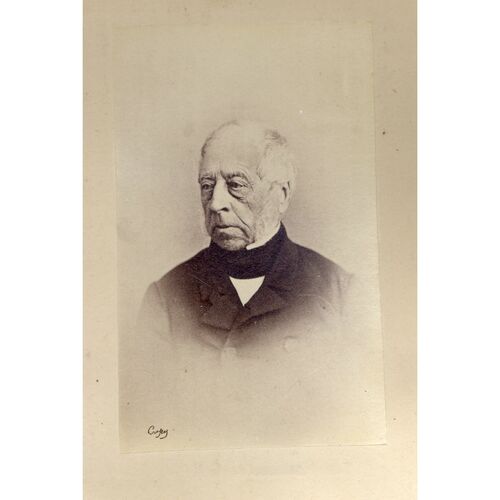LESLIE, JAMES, merchant and politician; b. 4 Sept. 1786 at Kair, Kincardine, Scotland, son of Captain James Leslie, James Wolfe*’s deputy quartermaster at Quebec in 1759; m. in 1815 Julia, daughter of Patrick Langan, seigneur of Bourchemin and Ramesay; d. 6 Dec. 1873 at Montreal, Que.
Before emigrating to Canada in 1804, James Leslie completed his studies at Marischal College and at the University of Aberdeen. As owner of the firm of James Leslie and Company, which was set up at Montreal in May 1809 and which specialized in the wholesale trade in foodstuffs, James Leslie met with rapid success. The doors of the business world were open to him, and he contributed to the formation of one of the most important financial institutions of the time, the Bank of Montreal, of which he proved to be an energetic director from 1817 to 1829. With George Moffatt*, Horatio Gates*, and Thomas Torrance, he formed part of the group that promoted strict business procedures and that did not consider the administration of the bank as a family undertaking.
Like the majority of the businessmen of his period, Leslie divided his other activities between his seigneuries of Bourchemin, Ramesay, and Lake Matapédia, and political life: from 1824 until the constitution of Lower Canada was suspended in 1838, he represented the county of Montreal East in the Legislative Assembly of that province. Increasingly he identified himself with the moderate wing of the Patriote party, and he was out of sympathy with the English merchants around him because of his support of this party. In December 1837, before the outbreak of armed disturbances, Leslie accompanied Louis-Hippolyte La Fontaine* to Quebec to ask the governor, Lord Gosford [Acheson*], to convene the houses of parliament, in the hope of avoiding recourse to other than constitutional means. Immediately after the failure of the 1837 rebellion, Leslie began to look favourably upon the possibility of a union of the two Canadas: “. . . a union of the Canadas will probably be proposed,” he wrote to La Fontaine on 6 Jan. 1838, “if on fair and equitable principles, I see no serious objection to it”; but he added “Care however must be taken that the representation is based upon population and that the heavy public debt of the Upper is not saddled upon the Lower Province . . . .”
Since the Act of Union went against these two principles, James Leslie stood as an anti-unionist candidate, and he met defeat in the county of Montreal at the first general election under the Union. A by-election in December 1841 enabled him to join the Reformers again in the following session, as mla for Verchères. He was re-elected in the same county in 1844 and 1847, and from 1848 to 1851 formed part of the ministry of Robert Baldwin* and La Fontaine; he was president of the Executive Council from 11 March to 14 Sept. 1848, then became provincial secretary on 15 September and kept this post until 27 Oct. 1851. He was appointed legislative councillor on 23 May 1848, and kept his seat until confederation; he was then called to the Canadian Senate, where he sat until his death.
BNQ, Société historique de Montréal, Collection La Fontaine, Lettres, 39 (copies in PAC). F.-J. Audet, Les députés de Montréal, 105–6. Can. directory of parliament (Johnson), 336. Can. parl. comp., 1872, 63–65. Turcotte, Conseil législatif de Québec, 145. Denison, Canada’s first bank, I.
Cite This Article
André Garon, “LESLIE, JAMES,” in Dictionary of Canadian Biography, vol. 10, University of Toronto/Université Laval, 2003–, accessed June 24, 2025, https://www.biographi.ca/en/bio/leslie_james_10E.html.
The citation above shows the format for footnotes and endnotes according to the Chicago manual of style (16th edition). Information to be used in other citation formats:
| Permalink: | https://www.biographi.ca/en/bio/leslie_james_10E.html |
| Author of Article: | André Garon |
| Title of Article: | LESLIE, JAMES |
| Publication Name: | Dictionary of Canadian Biography, vol. 10 |
| Publisher: | University of Toronto/Université Laval |
| Year of revision: | 1972 |
| Access Date: | June 24, 2025 |


![[Hon. James Leslie] [image fixe] / Studio of Inglis Original title: [Hon. James Leslie] [image fixe] / Studio of Inglis](/bioimages/w600.4261.jpg)

